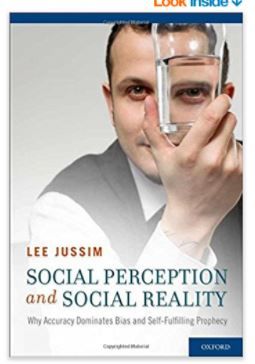This is the second of a two-part series, slightly adapted from an essay I wrote in 2002, for Dialogues, which was then a hard copy newsletter of the Society for Personality and Social Psychology. You can find Part I here.
I am re-posting it here because so much of it still applies.

In Part I, I explained what I meant by intellectual imperialism: the unjustified and ultimately counterproductive tendency in intellectual/scholarly circles to denigrate, dismiss, and attempt to quash alternative theories, perspectives, or methodologies. I also provided a slew of examples, including the decades-long dominance of behaviorism (only to be largely abandoned), unjustified scientific prejudices against replication failures, and nearly mythic beliefs in the superiority of experiments. In Part II, I continue, arguing that social psychology long has had a bias in favor of bias and against accuracy, and I propose that research that contests cherished narratives and findings should be given especially high priority in scientific peer review.
The Curious Case of Inaccuracy
For years, social psychologists, especially those with a social cognition orientation, have waxed enthusiastic over error and bias research, and rejected almost out of hand accuracy research. Consider the following:
"It does seem, in fact, that several decades of experimental research in social psychology have been devoted to demonstrating the depths and patterns of inaccuracy in social perception ... This applies ... to most empirical work in social cognition ... The thrust of dozens of experiments on the self-fulfilling prophecy and expectancy-confirmation processes, for example, is that erroneous impressions tend to be perpetuated rather than supplanted because of the impressive extent to which people see what they want to see and act as others want them to act ... (Jost & Kruglanski, 2002, pp. 172-173).
"Despite the obvious importance to social psychology of knowledge about person perception processes, the development of such knowledge was delayed by a preoccupation with the accuracy of judgments about personality ... The naivete of this early assessment research was ultimately exposed by Cronbach's elegant critique in 1955. Cronbach showed that accuracy criteria are elusive and that the determinants of rating responses are psychometrically complex" (Jones, 1985, p. 87).
"The accuracy issue has all but faded from view in recent years ... On the other hand, in recent years, there has been a renewed interest in how, why, and in what circumstances people are inaccurate" (Schneider, Hastorf, & Ellsworth, 1979).
Despite spending pages and pages on inaccuracy, error, and bias, both the recent round of handbook chapters and most undergraduate texts hardly discuss accuracy at all. The reasons for social psychology's rejection of accuracy research are too long and involved for this essay; two short points, however, highlight the intellectual imperiousness of attempts to denigrate or dismiss accuracy research. First, how can we possibly reach conclusions about inaccuracy unless we can also reach conclusions about accuracy? This question is mostly rhetorical because, on its face, the question seems ludicrous. It's not completely ludicrous, primarily because research on errors can provide insights into processes, but whether those processes typically lead to accurate

or accurate perceptions and judgments is a separate question that rarely can be addressed by process research. Furthermore, some biases (which are not necessarily the same thing as errors or inaccuracy) actually enhance accuracy (Jussim, 1991). All this is very rich and interesting, at least to some of us. The entire analysis, however, could not occur at all unless at least some researchers studied accuracy. This suggests that attempts to dismiss accuracy do us all a disservice by attempting to clamp theoretical and empirical blinders on the field.
Second, there is the supposed "criterion problem" in accuracy research (highlighted in the Jones quote). This criticism is so common that it has been known to evoke paroxysms of sweat, angst and even self-flagellation from people engaged in actual accuracy research. Aren't the criteria for evaluating the validity of social beliefs so vague and fuzzy as to render attempts to assess accuracy meaningless?
I have never seen criticisms of the criteria used to establish self-fulfilling prophecies that remotely resemble those leveled at accuracy research. I find this peculiarly ironic because, of course, although the processes by which a perceiver's belief become true are different, the criteria for establishing their trueness are (or, at least, should be) identical. Social psychology cannot have it both ways. It cannot be tortuously difficult to identify criteria for establishing accuracy unless it is equally tortuously difficult to identify criteria for establishing self-fulfilling prophecy. Conversely, it cannot possibly be unproblematic to identify criteria for establishing self-fulfilling prophecy unless it is equally unproblematic to identify criteria for establishing accuracy.
Some Scientific Claims Really Are Just Plain Wrong
Do not get me wrong. Sometimes mountains of data really do say "X is true and Y isn't." The end.(At least until someone comes up with new data saying Y could be true sometimes after all.) When there is sufficient research to document the falsity of Y, so be it, and we should all feel free to say that Y just ain't true. But the criteria should be the data — not our own preferences for one view over another. And the entire point of this essay is that premature denigration or dismissal of an area of research restricts our data, thereby reducing the quality of the science produced by our field. It is one thing if we have tons of data that Y isn't true. But it is another thing entirely if there is just no evidence that Y is true because research on Y has been prematurely stigmatized or trivialized. In such a case, the value and credibility of our field, and our ability to both understand human nature and to improve the social condition have been sorely limited.
Intellectual Affirmative Action?
Is there a solution? Well, one of the best solutions I know of to bias and discrimination remains affirmative action. Intellectual affirmative action would involve both reviewers and, especially, editors, taking a position of being especially favorably predisposed to publishing intellectually diverse (i.e., different perspective, different results) research.
I am not talking quotas or guarantees.

To get concrete, the next time you come across a study that fails to find stereotype threat effects, or a priming effect, or that finds people have extraordinarily good access to their own cognitive processes, or that conscious controlled processes seem to dominate over automatic ones — to overcome your own predisposition to reject such papers, set what may seem to feel to you like a lower theoretical and methodological bar for acceptance. This will merely compensate for your own predisposition to look negatively on such papers, thereby giving them a fair chance. Let the result out there, so the rest of us can do our work trying to sort it all out.
----------------------------------------------------
2019 Postscript. This essay was largely ignored when it came out. Nonetheless, Psychology's Replication Crisis has vindicated most of its main points (e.g., experiments have proven far less definitive than once believed, as described in Part I; stereotype threat has proven to be on very shaky grounds; priming studies of unconscious phenomena have been exceedingly difficult to replicate). I also think psychological research is in considerably better shape now than it was when this was first published.
References
Jones, E. E. (1985). Major developments in social psychology during the past five decades. In G. Lindzey & E. Aronson (Eds), The handbook of social psychology (Third edition, Vol 1., pp. 47-107). New York: Random House.
Jost, J. T., & Kruglanski, A. W. (2002). The estrangement of social constructivism and experimental social psychology: History of the rift and prospects for reconciliation. Personality and Social Psychology Review, 6, 168-187.
Jussim, L. (1991). Social perception and social reality: A reflection-construction model. Psychological Review, 98, 54-73.
Schneider, D. J., Hastorf, A. H., & Ellsworth, P. C. (1979). Person perception (2nd edition). Reading, Massachusetts: Addison-Wesley.
Skinner, B. F. (1990). Can psychology be a science of mind? American Psychologist, 45, 1206-1210.




